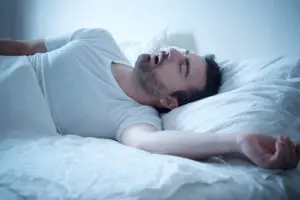Sleep apnea is a common yet serious sleep disorder where a person’s breathing is interrupted many times during the night as one sleeps. Whether you know you suffer from sleep apnea or you suspect you might, keep reading to find out why and how sleeping on your side can ease sleep apnea symptoms plus its risks and causes.

What Causes Sleep Apnea?
The breathing abnormality known as sleep apnea or OSA (obstructive sleep apnea) can be traced to the muscles in our upper airway . When these muscles become too relaxed while sleeping the airway becomes restricted and closes through the nose and throat.
Many people believe that snoring and sleep apnea are connected, but not everyone who snores has sleep apnea, and not everyone who has sleep apnea snores. How you feel during the day is the best indicator of sleep apnea. If you are fatigued and distracted during the day no matter how much time you spent in bed, you may have sleep apnea.
Sleeping on you back causes your airway to become restricted, whereas sleeping on your side is the best sleeping position for someone with sleep apnea since it allows the airway to remain open.
Dangers of Sleep Apnea
If you stopped breathing multiple times every hour while awake, you would head to see a doctor immediately. If it is happening while asleep, you should be just as concerned.
Untreated sleep apnea is linked to high blood pressure, heart disease, stroke, memory loss, obesity, and sleepwalking. It also causes repeated drops in blood oxygen levels and can lead to premature death.
Symptoms of Sleep Apnea
There are a few warning signs that should alert you to a possible case of sleep apnea. If you wake up with dry mouth or a sore throat, morning headaches, are restlessness during the night, or are fatigued during the day then you could quite possibly have a sleep disorder.
Serious symptoms of sleep apnea include the following:
- Loud and chronic snoring almost every night
- Gasping and choking while asleep
- Waking up short of breath
- Pauses in breathing
Sometimes these symptoms may only be noticed by a partner in your bed. If you sleep alone, you may want to record yourself to definitively confirm whether or not you experience any of these symptoms while asleep.
Who Is Most at Risk for Sleep Apnea?
Smokers are at high risk for developing sleep apnea. Smoking directly irritates you upper airway, throat, soft palate, and tongue.
Drinking alcohol before bed makes your muscles relax, including those in your throat. The same applies to prescription medications like muscle relaxers or sleeping pills.
Overweight men over the age of 50 with a family history of sleep apnea seem to have a higher risk along with African Americans and Hispanics.
Ways to Reduce Sleep Apnea Symptoms
You can look for ways to implemented changes to your lifestyle that will help reduce sleep apnea symptoms. These include trying to lose weight and reducing alcohol consumption.
The best way to mitigate potential symptoms is to sleep with continuous positive airway pressure known as a CPAP machine. If you have tried one before and it was uncomfortable to use, there have been many improvements.
Request a Sleep Apnea Consultation Today!
Remember to sleep on your side and seek treatment as soon as you notice symptoms that affect your daily life. Make an appointment with Coastal ENT at (912) 355-2335 if you suspect you may be suffering from sleep apnea.
